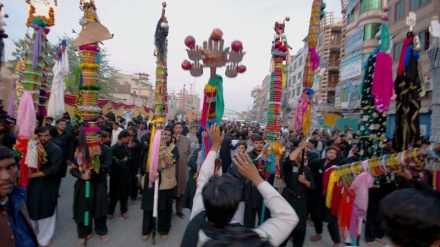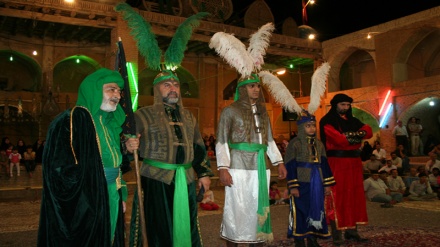Muharram mourning traditions in different lands - 3
In this series, which delves into the various mourning traditions associated with the Immortal Epic of Ashura in various countries of the world, we look at the earliest history of mourning for Imam Husain (AS).
Today, we continue our discussion on the evolution of the mourning ceremonies in Iraq immediately after the tragedy.
As we said yesterday, there was loud crying, mourning, lamentation and the sound of wailing from virtually every house in Kufa, following the memorable sermon of the martyred Imam’s sister, Hazrat Zainab (SA). The lamentation and mourning was for the Chief of Martyrs Imam Husain (AS), and it also spoke volumes about the brutality and callousness of the Omayyad rulers. It laid the foundation of the mourning ceremonies for the Prophet’s grandson in Iraq. When the noble captives were taken to the palace of Obeidullah ibn Ziyad, the tyrannical governor of Iraq who was the mastermind of the Karbala tragedy, the Prophet’s granddaughter controlled herself to a great extent despite the insults he hurled on the blessed household.
He mocked at the severed heads of martyrs, telling her to see what God had done to her household. The reply of Hazrat Zainab (SA) on the justice of God with the famous phrase: “Ma ra’itu illa jameela” (I have seen nothing but the grace and glory of God), made Ibn Ziyad angrier. Addressing him, she said in one of the most eloquent sermons that exposed the Omayyad crimes and moved the audience to tears:
“O son of Ziyad… You and the other henchmen of Yazid have, for the sake of worldly gains, flouted all the principles of Islam, have desecrated the dead bodies of the martyrs, despite the fact that it is strictly forbidden by religion, and subjected to us to the worst kind of ill treatment, although the Prophet had enjoined on all believers to treat the captives and particularly the women and the children with sympathy and consideration. Today you are gloating over your success and rejoicing; today you are thinking that you can insult and humiliate us because there is nobody to say a word to you on our behalf, because you see us in this helpless condition… But O tyrant, let me warn you that you will find your success ephemeral and very soon the wrath of God will descend on you and on those whose cause you are espousing. Very soon the nemesis will overtake you and all the others who have ruthlessly killed my brother and other members of my family simply because they stood steadfast in their belief; because they refused to surrender their principles or compromise their ideals; because they refused to accept Yazid, whose stooge you are, as the caliph of Muslims on account of his being a known profligate, who flouts all principles of Islam, tramples all ethical concepts and reduced all human beings to an abject state.”
A stunned Ibn Ziyad, sensing dangers of uprising in Kufa if the captives of Karbala remained there for long, sent them hastily towards his mentor Yazid in Syria but through circuitous routes so that the people of the towns and cities through which they pass will not be influenced by Hazrat Zainab (SA). He was afraid of the impact of the tragedy on the people of Iraq, who had already begun to mourn the martyrdom of Imam Husain (AS).
On the arrival of the Caravan of Captives in Damascus, and the festive atmosphere in the Syrian capital, Imam Zain al-Abedin (AS) was shocked and remarked: There was lamentation in Iraq, while there are celebrations in Syria (at our captivity). The fact is that the people of Syria who had been under Omayyad rule and propaganda for over four decades, and many of them were Christians or recent converts to Islam, were unaware of the identity of the Ahl al-Bayt and their status.
This is evident by the remarks of a Syrian man who mocked the Captives of Karbala and thanked God that Yazid had triumphed over them. When Imam Zain al-Abedin (AS) asked him, whether he had read the holy Qur’an, the Syrian man replied in the affirmative. When the Imam asked whether he had read ayah 33 of Surah Ahzaab where God Almighty vouchsafes the pristine purity of the Prophet’s Ahl al-Bayt, he said he had.
The Imam recited other ayahs of the Qur’an regarding the prime position of the Ahl al-Bayt, which made the Syrian ask the relationship of you captives to the Qur’an? When Imam Zain al-Abedin (AS) explained that we are the Ahl al-Bayt, the man was shocked, started beating his head and cried. This could be called among the first instances of mourning in Syria for Imam Husain (AS).
That ends our programme for today. Don’t forget to tune in again tomorrow for another interesting episode of Muharram Mourning Traditions in Different Lands. God bless you and goodbye.


